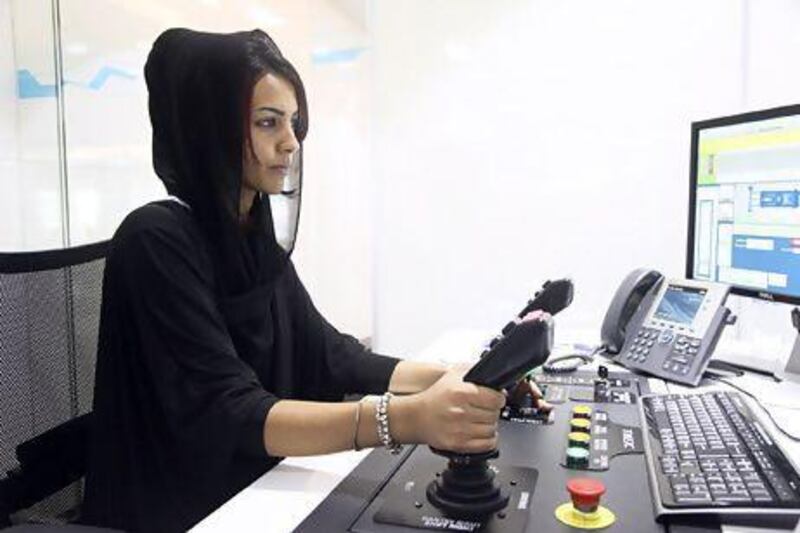Carefully manicured nails painted bubblegum pink and an abaya. No surprise for an Emirati teenager perhaps, but this one also operates computerised cranes at a port.
For Abeer Al Mheiri, 18, it is all in a day's job.
Little more than a month into her new role, the trainee crane operator at Khalifa Port says she feels at home already. "My family first thought I was just talking and then was shocked, but they were encouraging," Ms Al Mheiri says.
While she is one of more than 100,000 Emirati women in the UAE workforce, according to the website of Sheikh Mohammed bin Rashid, Vice President of the UAE and Ruler of Dubai, not many of them are in industrial jobs.
But the challenge of doing something new and the technical aspects of the job are what drew the teenager to the dockside.
"In the last 10 years especially, there has been an increase in [the] number of Emirati females looking to enter the workforce and in different types of jobs, including industrial and engineering roles," says Abdul Muttalib Al Hashimi, the managing director of Next LevelManagement Consultancy, a headhunting company that specialises in Emirati placements.
One of the notable local women who have made a mark in the Emirates' industrial sector is Etihad Airways' first female Emirati pilot, Salma Al Baloushi.
As for Ms Al Mheiri, it is just the beginning. She will remain a trainee until the end of this month.
After a container is lifted off a vessel by a manual ship-to-shore crane, it is placed on a lorry.
The port's 26 computerised stacking cranes, which Ms Al Mheiri and her colleagues operate from a remote station, take the containers from the lorry to the yard.
These are then moved to different locations for sorting, storage and delivery. Ms Al Mheiri's five colleagues in the control room are all men and older than her. They hail from around the region, as well as the Philippines and India. They give her tips on how to manoeuvre the joysticks, while keeping an eye on the four cameras that flash on screen simultaneously so that the containers, which can weigh more than 30,000 kilograms, are not dropped.
On her six-hour shift, which runs from 10am to 4pm, typically the busiest part of the day, she handles an average of 80 containers.
Khalifa Port, which opened in September, receives one to two vessels a day, each carrying between 2,000 and 7,000 containers. The current annual capacity of the port is 2.5 million 20-foot equivalent units (TEUs) of container traffic.
Compared with other jobs at the port, operating automated cranes from inside a control room seems more like a Sony PlayStation game, says Ahmed Al Mutawa, the director of container terminal operations at Abu Dhabi Terminals. But he knows the teenager has an important role to play.
With Ms Al Mheiri's recruitment, Abu Dhabi Terminals, the operator of Khalifa Port, hopes to set an example for other Emirati women.
"She will open the opportunity for female Emiratis to join in [the] port business, which is seen as very tough for ladies," Mr Al Mutawa says. "With Abeer's example, we hope to change that." Few women in the region make it to the workforce despite high graduation numbers, says a report published in October by the Economist Intelligence Unit that was sponsored by the Mubadala-owned Advanced Technology Investment Company.
In total, women account for a quarter of the workforce in the Middle East, far below the global average of 52 per cent. Unemployment among women between 15 and 29 years is 30 per cent in the Middle East compared with 14 per cent globally.
"One of the most obvious challenges women face is family or society's view of women who work in uncommon jobs," Mr Al Hashimi says.
"Sadly, this perception is increasingly adopted by some employers who seem reluctant to take on female Emiratis for such roles and are more comfortable taking on expatriate female workers."
A graduate from an international school in Abu Dhabi, Ms Mheiri plans to start applying for engineering courses at universities in Abu Dhabi next year. But she will not leave her job at Abu Dhabi Terminals, opting instead to study in the evenings.
"This is like my family," she says.





